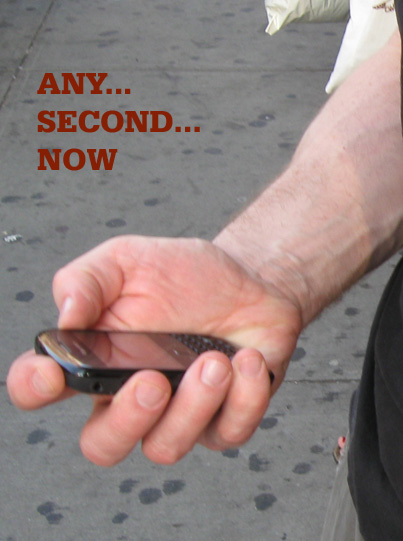Actors are the only people I know who talk about this much, but everyone who works in film production has to deal with it. It’s the silent killer of hope, the thing that keeps us up all night, and makes us into smokers, coffee drinkers, and sometimes alcoholics. I’m talking, of course, about waiting.
Once you’ve finished writing a script; once you’ve sent your feature out to festivals; once you’ve wrapped up your last gig and recovered from the wrap party; once you’ve auditioned… you’re in the horrible position of waiting. There’s always plenty to do, but it’s hard to muster up any energy. You socialize for a bit, catch up with all the people you’ve been neglecting, try (for the latest time) to make things up to your spouse/sweetheart/squeeze. You write the next script, scan the want ads, prepare for the next batch of festivals. But some part of your day is spent thinking about the call or email you haven’t gotten yet. If the waiting goes on long enough, the mental black hole that it creates grows.
A few years ago I finished a spec script, and did the usual thing of sending out query letters. A production company whose films I much admired wrote me back asking for it. I sent it off the next day, then spent about three months in various states of agony. I really tried to forget that I’d sent it away, and succeeded to some extent. But the nagging feeling of unfinished business was always there, especially at the end of the day when I was trying to go to sleep. I was almost relieved when I finally got the rejection slip.
The process of sending out Found In Time to festivals and agents is bringing back similar feelings, but I think I’m dealing with them better. Here’s what I’ve learned so far:
It’s pointless to ignore your feelings… so you might as well admit that you’re unhappy waiting for a response. Then try and get back to work.
Focus on specific tasks with measurable goals. We all need something to occupy our minds. It might as well be something that we can gain some sense of accomplishment from.
Commiserate with your friends but don’t bitch. There’s a fine line and I’m not really sure where it is. But if you keep circling around a topic with your other film friends over and over again and it makes you feel worse, chances are you’ve crossed it.
It’s not personal. This is the tough one. When you receive a rejection notice you feel like crap, but you can always say that they didn’t like the script/performance/resume because of a difference in taste (which it often is). When you have haven’t heard anything, you start to feel like a loser. Once I worked on four back-to-back features in seven months as a UPM or line producer, but then didn’t work for two months. By the end of that stretch I felt like hell. Of course, this was at the beginning of the recession. While it was pretty obvious to everyone around me that the whole ship was on fire, I just thought I sucked.
Use the tension. The anxiety can be put to some use. When I’m waiting, my workouts tend to be harder and my writing a little sharper. If I can’t sleep, I’ll try to do something productive with my newly-found time. This doesn’t always work, of course.
Don’t give in to depression. Depression is like a warm grey blanket. It’s a great way to keep from feeling anything, and it is useful sometimes (particularly when the emotions involved are too painful to really process). But it’s very easy to live in it every day. Rituals and structures often help. When I was out of work I still woke up in the morning, showered, and changed clothes. Even though I could sit around in my bathrobe all day I found it kept my mind fresh to change. My actor friends take classes – acting, dance, continuing education, anything to keep their minds sharp.
The best thing to do is to find another project to work on. I’m starting my next script, in part so I don’t think too much about the festivals. I don’t want to lose sight of my long-term objective – to get Found In Time sold – but I do want to keep from obsessing over that which I have no control.
How do you handle waiting? How do you keep it from interfering with your life? Do you accept it, fight it, or keep it out of your mind altogether?


The Buddhists say that waiting is as equal and essential a part of living as is doing. Although we are apt to discriminate the one being more worthy than the other, there is a certain grace accomplished in accepting these balances in life; that which is in our control, and that which is not. Easier said than done, of course – but it isn’t always about the doing.
Thank you for your thoughtful reply. You’re absolutely right – waiting is essential. It’s not something I’m trained to do particularly well. 🙂 But hopefully, I’m learning.